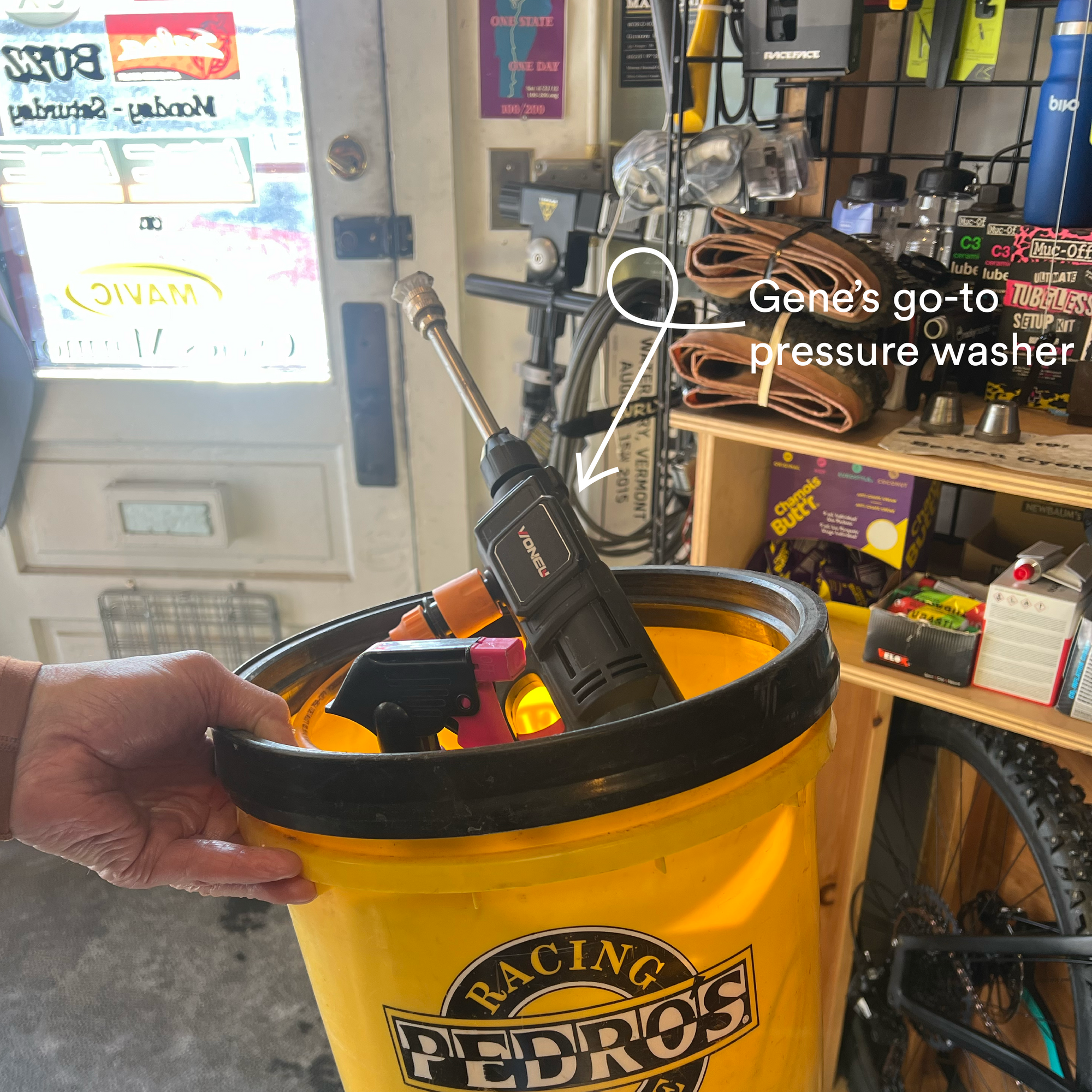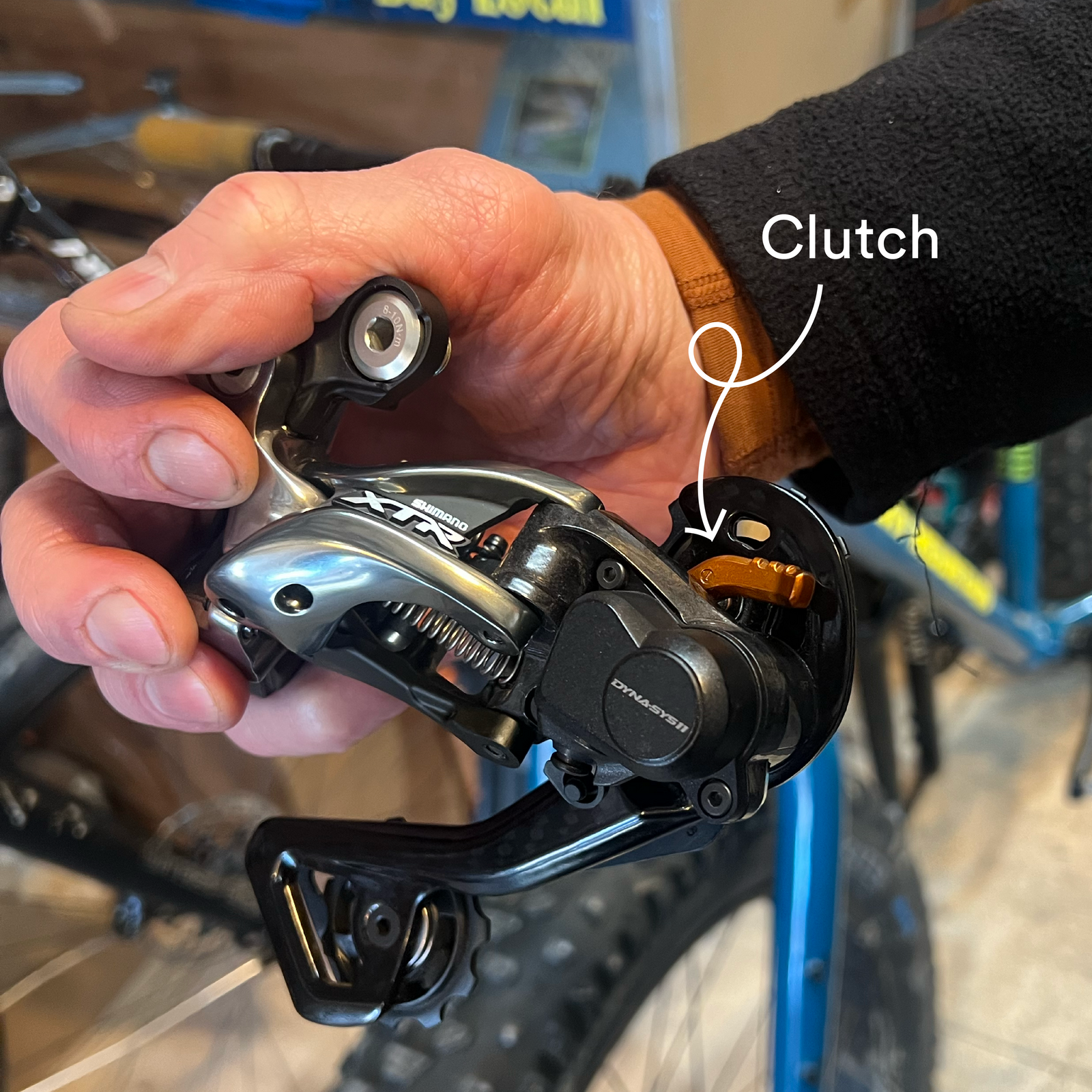That tired me out.
February 6th, 2025 | By Keaton Smith
Riding in the winter? Salt could ruin your bike. Unless you clean your bike properly and regularly.
In areas of the country like Vermont where winter roads are heavily salted, anytime your bike is on the road, it’s probably exposed to salt.
If salt is not washed off, rust creeps in and can damage your components, which aren’t cheap or cause larger structural damage, also definitely not cheap.
So, to protect your bike during winter riding, dealing with salt is essential. But how?
To figure it out, I talked to an expert, just across the street from Bivo’s HQ. I spoke with Gene Bell, owner of Belgen Cycles in Richmond. Gene is a regular winter commuter, who can always be seen riding to and from work in almost all conditions and holds a giant wealth of knowledge about all things bikes. He shared his expertise with me, thanks, Gene!
Riding in the winter? Salt could ruin your bike. Unless you clean your bike properly and regularly.
In areas of the country like Vermont where winter roads are heavily salted, anytime your bike is on the road, it’s probably exposed to salt.
If salt is not washed off, rust creeps in and can damage your components, which aren’t cheap or cause larger structural damage, also definitely not cheap.
So, to protect your bike during winter riding, dealing with salt is essential. But how?
To figure it out, I talked to an expert, just across the street from Bivo’s HQ. I spoke with Gene Bell, owner of Belgen Cycles in Richmond. Gene is a regular winter commuter, who can always be seen riding to and from work in almost all conditions and holds a giant wealth of knowledge about all things bikes. He shared his expertise with me, thanks, Gene!


Gene showed me his go-to tools for washing off the bike while at work
Gene showed me his go-to tools for washing off the bike while at work
Got Salt? Wash it Away, Quickly.
After every ride (right away, "don't get a beer first," Gene emphasized), douse your bike with hot water, either poured from a water bottle, a bucket, from a pressure hose, or from a spray bottle for plants.
Walk around the whole bike and just get the salt off, “that’s the number one thing,” Gene said. You don’t need to scrub the bike, just get the salt off by pouring water on the bike.
Dry it Down with a Rag
After that, Gene made it clear: “it’s all about the rag.” Dry off the rotors first with a clean rag, then you can detail anything else you want. The last step is to detail the chain. This guarantees you won’t get grease on your rotors or anywhere else it shouldn’t be.
Then lube up, but don’t overdo it…(“most people over lube.”) With too much lube, the chain “is just a magnet for crap,” picking up debris and grit from the road, rather than putting the right amount on to help the rollers on the chain.
A Caution to Hitch Bike Rack Users in the Winter
Driving around with your bike on a rear hitch rack in the winter (in salty areas) means that salt is guaranteed to spray all over your bike.
So, even if you didn’t ride on the road, cleaning your bike after it took a winter journey on your rear rack is necessary. (Fat tire bikers, looking at you!!)
“The worst thing you can do is get home and get out of your car and not do anything.”
Wash off the salt with hot water!
Got Salt? Wash it Away, Quickly.
After every ride (right away, "don't get a beer first," Gene emphasized), douse your bike with hot water, either poured from a water bottle, a bucket, from a pressure hose, or from a spray bottle for plants.
Walk around the whole bike and just get the salt off, “that’s the number one thing,” Gene said. You don’t need to scrub the bike, just get the salt off by pouring water on the bike.
Dry it Down with a Rag
After that, Gene made it clear: “it’s all about the rag.” Dry off the rotors first with a clean rag, then you can detail anything else you want. The last step is to detail the chain. This guarantees you won’t get grease on your rotors or anywhere else it shouldn’t be.
Then lube up, but don’t overdo it…(“most people over lube.”) With too much lube, the chain “is just a magnet for crap,” picking up debris and grit from the road, rather than putting the right amount on to help the rollers on the chain.
A Caution to Hitch Bike Rack Users in the Winter
Driving around with your bike on a rear hitch rack in the winter (in salty areas) means that salt is guaranteed to spray all over your bike.
So, even if you didn’t ride on the road, cleaning your bike after it took a winter journey on your rear rack is necessary. (Fat tire bikers, looking at you!!)
“The worst thing you can do is get home and get out of your car and not do anything.”
Wash off the salt with hot water!
Bonus: What Shimano Winter Riders Should Know
Have a Shimano derailleur? This tip is for you!
Shimono’s clutch is susceptible to foul weather and winter riding (more so than other brands). When exposed to water, the clutch can cramp up and make it hard to shift.
So, if you’re a winter rider with a Shimano derailleur and you’re having shifting troubles, first look at the clutch as it could be seized up. If it is seized up, use some lubricant spray to get it working again.
Bonus: What Shimano Winter Riders Should Know
Have a Shimano derailleur? This tip is for you!
Shimono’s clutch is susceptible to foul weather and winter riding (more so than other brands). When exposed to water, the clutch can cramp up and make it hard to shift.
So, if you’re a winter rider with a Shimano derailleur and you’re having shifting troubles, first look at the clutch as it could be seized up. If it is seized up, use some lubricant spray to get it working again.

Keaton Smith
February 06, 2025
Yes definitely lot’s of commitment required :) ! I really need to get better at this myself. Thanks, J.